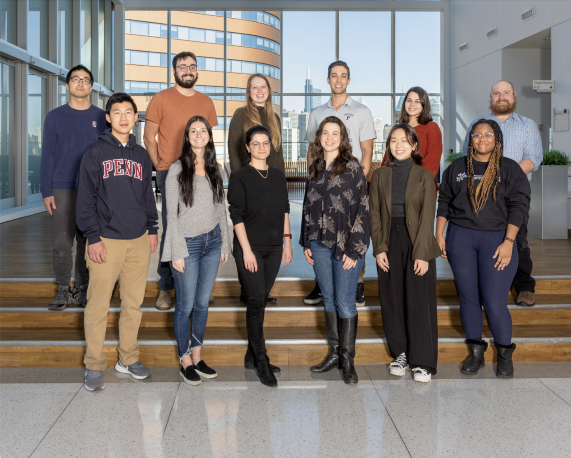
Elizabeth Heller, Ph.D.
University of Pennsylvania
Department of Systems Pharmacology and
Translational Therapeutics
Institute for Translational Medicine and Therapeutics
Laboratory of Neuroepigenetics
10-115 Smilow Center for Translational Research
3400 Civic Center Blvd, Building 421
Philadelphia, PA 19104

Proteomic characterization of inhibitory synapses. During doctoral training at The Rockefeller University under the mentorship of Dr. Nathaniel Heintz, I aimed to genetically tag and purify individual synapse types in the mammalian brain, in order to characterize their protein content using an innovative biochemical enrichment strategy coupled with high throughput proteomic analysis. In pursuit of this goal, I developed the first protocol for the specific biochemical isolation and characterization of the elusive inhibitory synapse. We made a remarkable discovery, namely, that inhibitory synapses consist of structural proteins and ion channels, yet are completely lacking in the signaling molecules that comprise the major component of excitatory synapses.
Selimi F, Cristea IM, Heller E, Chait BT, Heintz N. Proteomic studies of a single CNS synapse type: the parallel fiber/purkinje cell synapse. PLoS Biol. 2009 Apr 14;7(4):e83. PubMed PMID: 19402746; PubMed Central PMCID: PMC2672601.
Heller EA, Zhang W, Selimi F, Earnheart JC, Ślimak MA, Santos-Torres J, Ibañez-Tallon I, Aoki C, Chait BT, Heintz N. The biochemical anatomy of cortical inhibitory synapses. PLoS One. 2012;7(6):e39572. PubMed PMID: 22768092; PubMed Central PMCID: PMC3387162.
Identification of critical period for sleep-consolidated spatial memory. During my undergraduate training I conducted an independent study under Dr. Ted Abel, aimed at elucidating the time course of sleep-induced memory formation in mice by examining memory deficits that result from sleep deprivation during discrete times following learning. We found that fear conditioning is blocked by sleep deprivation during a time period 5-10 hours post training, but unaffected by sleep deprivation for five hours immediately following training. This finding provided critical insights into the time-course of sleep-induced memory consolidation.
Graves LA, Heller EA, Pack AI, Abel T. Sleep deprivation selectively impairs memory consolidation for contextual fear conditioning. Learn Mem. 2003 May-Jun;10(3):168-76. PubMed PMID: 12773581; PubMed Central PMCID: PMC202307.
Locus-specific epigenetic editing for the study of addiction and depression. My postdoctoral research aimed to investigate the causal molecular mechanisms by which chromatin modifications contribute to reward-related pathology in the mammalian brain. There is a preponderance of compelling evidence implicating epigenetic modifications in the pathology of addiction and depression, in both human patients and animal models, yet previous studies have been unable to distinguish between the mere presence and the functional relevance of epigenetic modifications at relevant loci. To elucidate the molecular function of epigenetic regulation relevant to reward pathology, I have developed the use of engineered transcription factors to deliver histone modifications to a specific gene of interest in reward-related regions of the mammalian brain (major publications listed in Personal Statement).
Identification of cellular and molecular mechanisms underlying addiction and stress. In addition to pursuing my main postdoctoral research project, described above, I have also worked with others both inside and outside of the Nestler lab to investigate the molecular basis of drug addiction. For example, I have studied the role of serum- and glucocorticoid-inducible kinase 1 (SGK1) in regulating morphine and cocaine reward, and found that while its transcription and activity are upregulated in vivo by morphine and cocaine, exogenous SGK1 overexpression causes opposite behavioral responses to these two drugs. I have also contributed to several additional studies on the epigenetics of addiction, such as the role of nucleosome remodeling and the Sirtuin family of histone deacetylase.
Ferguson D, Koo JW, Feng J, Heller E, Rabkin J, Heshmati M, Renthal W, Neve R, Liu X, Shao N, Sartorelli V, Shen L, Nestler EJ. Essential role of SIRT1 signaling in the nucleus accumbens in cocaine and morphine action. J Neurosci. 2013 Oct 9;33(41):16088-98. PubMed PMID: 24107942; PubMed Central PMCID: PMC3792451.
Cates HM, Thibault M, Pfau M, Heller E, Eagle A, Gajewski P, Bagot R, Colangelo C, Abbott T, Rudenko G, Neve R, Nestler EJ, Robison AJ. Threonine 149 phosphorylation enhances ΔFosB transcriptional activity to control psychomotor responses to cocaine. J Neurosci. 2014 Aug 20;34(34):11461-9. PubMed PMID: 25143625; PubMed Central PMCID: PMC4138349.
Koo JW, Lobo MK, Chaudhury D, Labonté B, Friedman A, Heller E, Peña CJ, Han MH, Nestler EJ. Loss of BDNF signaling in D1R-expressing NAc neurons enhances morphine reward by reducing GABA inhibition. Neuropsychopharmacology. 2014 Oct;39(11):2646-53. PubMed PMID: 24853771; PubMed Central PMCID: PMC4207344.
Heller EA, Kaska S, Fallon B, Ferguson D, Kennedy PJ, Neve RL, Nestler EJ, Mazei-Robison MS. Morphine and cocaine increase serum- and glucocorticoid-inducible kinase 1 activity in the ventral tegmental area. J Neurochem. 2015 Jan;132(2):243-53. PubMed PMID: 25099208; PubMed Central PMCID: PMC4302038.
Research Interest
The Heller Lab studies the mechanisms by which remodeling of the epigenome leads to aberrant neuronal gene function and behavior. To approach this problem, we directly manipulate histone and DNA modifications at specific genes in vivo, using viral delivery of epigenetic editing tools. We focus on uncovering the mechanisms by which chromatin modifications interact with the transcriptional machinery following exposure to psychostimulants, such as drugs of abuse and stress. Because the behavioral disease traits of addiction and depression persist long after cessation of the harmful experience, stable epigenetic remodeling is an attractive mechanism for such long-lasting effects and presents an intriguing target for therapeutic intervention.
Lab Members
| FIRST NAME | LAST NAME | TITLE | |
|---|---|---|---|
| Elizabeth | Heller | PI | eheller@mail.med.upenn.edu |
| Kyle | Czarnecki | Research Specialist | kyle.czarnecki@pennmedicine.upenn.edu |
| Ericka | Ekobeni | Undergraduate Student | ekobenic@seas.upenn.edu |
| Chloe | Han | Undergraduate Student | chloehan@sas.upenn.edu |
| Elizabeth | Heller | Assistant professor | eheller@pennmedicine.upenn.edu |
| Marisol | Hooks | CAMB Rotation Student | marisol.hooks@pennmedicine.upenn.edu |
| Keegan | Krick | CAMB Thesis Student | kskrick@pennmedicine.upenn.edu |
| Yuan | Li | Graphic Designer | liyuan3@design.upenn.edu |
| Michael | Murphy | NGG Graduate Student | mdmurphy@pennmedicine.upenn.edu |
| Emily | Ng | Undergraduate Student | emilyng@sas.upenn.edu |
| Astrid | Ramos-Rolón | NGG Graduate Student | astrid.ramos-rolon@pennmedicine.upenn.edu |
| Molly | Reilly | Postdoctoral Fellow | Molly.Reilly@Pennmedicine.upenn.edu |
| Kiara | Rodriguez | CAMB Thesis Student | rkiara@upenn.edu |
| Julia | Winter | Postdoctoral Fellow | Julia.Winter@Pennmedicine.upenn.edu |
| Morgan | Woolf | Research Specialist | morgan.woolf@pennmedicine.upenn.edu |
| Ethan | Zhang | Undergraduate Student | ezhang7@sas.upenn.edu |
| Shuo | Zhang | Postdoctoral fellow | Shuo.Zhang@pennmedicine.upenn.edu |


